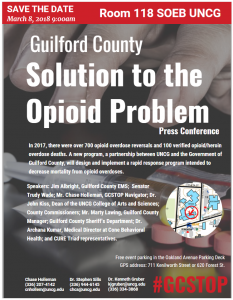Guilford County Solution to the Opioid Problem (GCSTOP) ProgramLike many places across the U.S., Guilford County is trying to determine how to best address the opioid epidemic and stop the illicit use of prescription opioids and heroin. In 2017 alone, there were over 700 opioid overdose reversals and 100 verified opioid/heroin overdose deaths (EMS, Guilford County, 2017).The impact on health and loss of life reflected in these statistics underscore the need address risky use practice and to get users to turn to treatment rather than continuation of drug use. A new program, a partnership between UNCG Center for Housing and Community Studies and the Government of Guilford County, will design and implement a rapid response program intended to decrease mortality from opioid overdoses among the opioid user population. Our program goal for 2018 is to reduce the incidence of deaths due to opioid overdose in Guilford County by 20% (n~36 case reduction from 2017 accounting for regional trends in increase/decrease as monitored by NC Detect).The Guilford County Solution to the Opioid Problem (GCSTOP) program will engage citizens who overdose and who are at high risk of overdose in harm reduction practices, distribute and train on the use of naloxone (a life-saving narcotic antagonist), conduct community health education, coordinate community resources with other community partners (C.U.R.E. Triad), and build relationships focused on ending opioid overdose. Recent funding to the County Emergency Services from the State General Assembly will be used to support the development and initial implementation of a Rapid Response Team (RRT) intervention designed to reduce the negative consequences of use (i.e., harm reduction) and eventually convince users to enter treatment.The program will be monitored and evaluated by the UNCG Center for Youth, Family, and Community Partnerships. Research and evaluation findings will be disseminated through a white paper series, community forums, academic and professional conference presentations, journal articles, and media releases.
